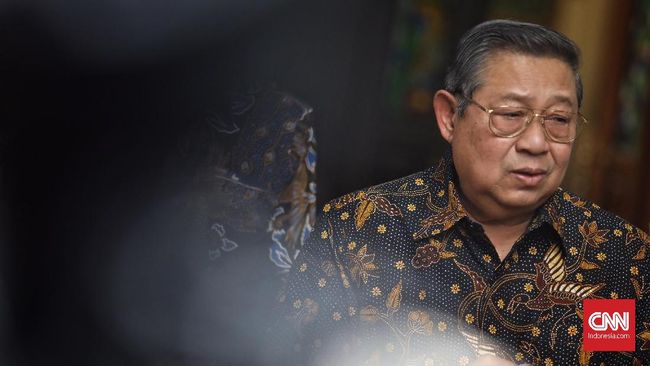Jakarta, CNN Indonesia —
The sixth President of the Republic of Indonesia Susilo Bambang Yudhoyono (SBY) reminded that a dark scenario will occur if the Indonesian government and other countries do not try to change the current economic conditions while encouraging sustainable development.
This was conveyed when he was a keynote speaker at the International Conference of Islamic Studies forum held by UIN Ar Rainiry Aceh.
“There is something wrong with our economy, with our development,” said SBY in the forum which was broadcast live on the UIN Ar Rainiry Campus Youtube channel, Monday (4/10).
“The dark scenario will happen and again the dark scenario will happen where we don’t do anything, don’t make the necessary changes,” he continued.
In that forum, SBY explained that 30 percent or equivalent to 2.3 billion people of the world’s population still hold poor status. Every night, said SBY, there are 1 billion people who starve because they are hungry, do not eat enough, and do not have money to meet their food needs.
“There is a nation that has excess food, there is a nation that lacks food, the price is often unstable and soaring, that’s the world, that’s our challenge,” said SBY.
Meanwhile, in Indonesia, the population is predicted to increase to around 306 million people in 2035, with the number of consumers increasing to 130 million people before 2030.
“Of course, Indonesia’s basic human needs will also increase sharply,” he said, adding that there were still many poor people in Indonesia.
On the other hand, said SBY, there is the application of a greedy lifestyle, as well as efforts to drain natural resources. “As a result, the earth is getting hotter, natural resources are getting depleted,” he continued.
He reminded the history of very capitalistic economic practices and pursuing growth with an absolute market mechanism actually threatened the survival of human beings themselves.
For example, the industrial revolution in the 17th and 18th centuries caused unnatural resources to be depleted, the environment to be damaged, and inequality to widen.
To anticipate this, according to SBY, it is necessary to take unusual economic actions that do not only pursue economic growth.
“Therefore, we need an answer, what is the answer? In accordance with the theme, the answer is let us now move forward in building and implementing the principles of sustainable development,” he said, who is also the chairman of the Democratic Party’s Upper House.
“In building and running an economy, choose a system model and economic practice that is also suitable for the challenges of this century, I say” green economy,” continued SBY.
“All countries must undertake a major transformation towards green economy, going to sustainable development,” he said.
If world leaders and Indonesia do not have political will or political will with weak policies, he fears that the future of mankind will be bleak.
|
SBY’s RAPBN Facts on Infrastructure and the Real Sector. (Photo: Fajrian)- – |
“If the future is bleak, morally the leaders are irresponsible, immoral for their grandchildren,” he said.
“Those who are unwilling and unable to transform will be excluded and left behind, the Indonesian people do not want to be excluded and left behind,” he said.
Previously, President Jokowi admitted that he was committed to achieving the targets of the Sustainable Development Goals (SDGs) by 2030, even though the Covid-19 pandemic presented a number of difficulties.
“Indonesia’s commitment to the SDGs has not subsided even in the midst of a pandemic,” said Jokowi at the UN Economic and Social Council Session, July 13, 2022, Wednesday (14/7).
The SDGs are a global action plan agreed by world leaders, including Indonesia, to end poverty, reduce inequality and protect the environment with 17 Goals and 169 Targets that are expected to be achieved by 2030.
Meanwhile, Indonesia is still struggling with environmental management issues, legislation that favors mining entrepreneurs, who are prone to destroying nature, to agrarian conflicts between mining corporations and residents.
(iam/arh)
– .


